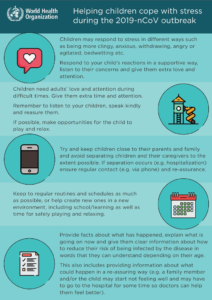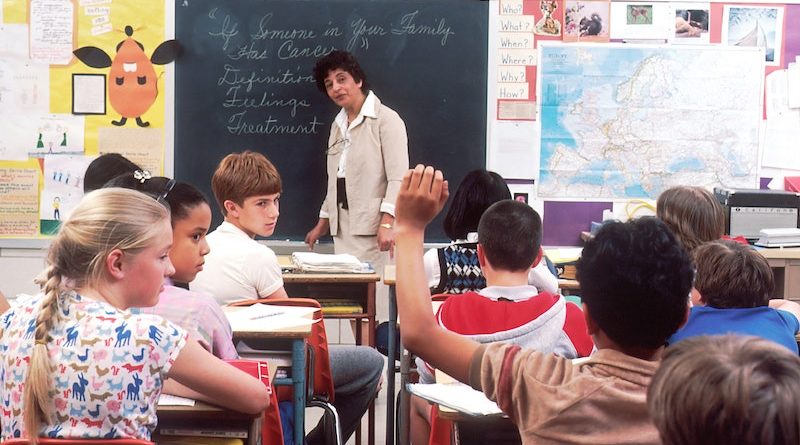The outbreak of COVID-19 has forced our globalised world to a standstill. It has also led to school closures throughout the world. UNESCO estimates that these measures impact approximately 89 percent of the world’s student population, representing 1.54 billion children and youth enrolled in school or university, including nearly 743 million girls. The economic impacts of COVID-19 are not yet fully known, however UNESCO expects that they will be widespread and far reaching, particularly for women and girls. The world is amid a global health crisis that is likely to remain for some time and is having dramatic consequences on children’s lives. In order to reduce the risk of trauma among children it is argued that it is imperative for nation states to adopt child centred approaches and that Governments should explain in child friendly ways the reasons behind the drastic measures that are taken, especially measures that affect children directly and profoundly, like schools closing. UNICEF explains that disruptions to society have a heavy impact on children; on their safety, their well-being, their future.
 The effects from the current COVID-19 pandemic are being felt by all humans around the world and it is crucial that we take care of our mental health during this time. Lack of face to face social interaction and abrupt changes in daily routine does have a negative impact on some children and adolescent’s mental health and those with pre-existing mental health issues are especially vulnerable. A survey undertaken by UK based children and adolescent mental health support service YoungMinds, reveals that 83% of the 2111 participants under the age of 25 felt that the COVID-19 pandemic has made their condition worse. Participants had pre-existing mental health issues and 26% said they were unable to access mental health support; peer support groups and face-to-face services have been cancelled. Some of them find it challenging to access support via phone or online methods.
The effects from the current COVID-19 pandemic are being felt by all humans around the world and it is crucial that we take care of our mental health during this time. Lack of face to face social interaction and abrupt changes in daily routine does have a negative impact on some children and adolescent’s mental health and those with pre-existing mental health issues are especially vulnerable. A survey undertaken by UK based children and adolescent mental health support service YoungMinds, reveals that 83% of the 2111 participants under the age of 25 felt that the COVID-19 pandemic has made their condition worse. Participants had pre-existing mental health issues and 26% said they were unable to access mental health support; peer support groups and face-to-face services have been cancelled. Some of them find it challenging to access support via phone or online methods.
The Convention on the Rights of the Child is an important human rights treaty of the international human rights framework that acknowledges children’s rights as human rights. Included in the preamble is that childhood (childhood is defined as being any person under the age of 18) is entitled to special care and assistance. It is important that we acknowledge that the COVID-19 pandemic is a stressful and traumatic event for children and adolescents and that we validate the fear and anxiety that some of them may be going through during this time of upheaval. The Centers for Disease Control and Prevention make clear that coping with stress will make individuals, the people they care about and their community stronger. Lee argues that as the pandemic continues, it is important to support children and adolescents facing bereavement and issues related to parental unemployment or loss of household income. There is also a need to monitor young people’s mental health status over the long term, and to study how prolonged school closures, strict social distancing measures, and the pandemic itself affect the wellbeing of children and adolescents. We all have a role to play in ensuring the wellbeing of children and adolescents are a priority. We need to listen to our children, let them express their worries and concerns, remind them that they are loved, limit exposure to the news cycle and ensure that information they receive is factual, embrace technologies that ensure continuity of learning. UNICEF Australia suggests some helpful tips for parents that will help them comfort and protect their children during the pandemic. Importantly any feelings of anxiety and stress must be validated. By having an open, supportive discussion with your children, it helps them understand, cope and even make a positive contribution for others. Parents should also maintain self-care.
Every country will face their own unique challenges during the COVID-19 pandemic, however now more than ever, we need to stand in solidarity and work together as a global community for the sake of children and adolescents. We should pay attention to children and adolescents with pre-existing mental health issues and those who are in vulnerable situations. By working together and standing united we can address the challenges that will be barriers for the continuity of learning. It is imperative that we address the challenges with a focus on the inherent dignity and of the equal and inalienable rights of all members of the human family because this is the very foundation of freedom, justice and peace in the world.
If you or anyone you know needs help:
International
World Health Organisation at https://www.who.int/mental_health/en/
Australia
Australian Psychological Association
Lifeline on 13 11 14
Kids Helpline on 1800 551 800
Mensline Australia on 1300 789 978
Suicide Call Back Service on 1300 659 487
Beyond Blue on 1300 224 636
Headspace on 1800 650 890
Reachout at au.reachout.com
Caribbean
Black Rock Psychiatric Hospital
Nigeria
Federal Neuropsychiatric Hospital Aro Abeokuta
UAE
Sharjah Child Friendly Office, Social Media: @sharjahchildfriendly
UK
YoungMinds on 0808 802 5544
Pakistan
RESOURCES:
American Psychological Association
Centers for Disease Control and Prevention
Image by Anastasia Gepp from Pixabay











